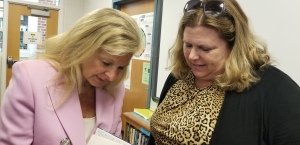
Photo by Cynthia Price
I am a semi-practitioner of Feng Shui, Marie Kondo, minimalism, and anything to do with making my environment Zen.
Books, though, will always hold a special place and are not likely to be removed.
As an author who aspires to be published, I am inspired by the authors I meet. I enjoy hearing what drew them to writing, where they find their characters, when they write, and where they write.
I enjoy attending author lectures and book signings. I’ve become quite savvy at navigating the queue for the book signing so that I’m not waiting hours.
Almost every author I have met has not only signed my book but has offered writing tips, suggestions to find an agent, and groups to join.
I learned about Sisters in Crime through Janet Evanovich. It was many years later before I connected with the group but I always knew I would because she had recommended them.
Whenever I see Adriana Trigiani she reminds me that the best writing advice is simple, “Write!”
At a Malice Domestic conference, I bumped into Michael Connelly and, to make a long story short, he paused to chat with me for about five minutes. This was when he only had a few books to his name and their was no Prime show called, “Bosch.” He didn’t hesitate to encourage, offer advice, and share a story or two.

Lisa Scottoline signs my book and offers advice.
The other week I heard Lisa Scottoline speak as part of All Henrico Reads. I joined a small queue to have my book signed during a pre-event. The next thing I knew she was offering advice as we posed for pictures. Her inscription in my book inspires, too. She wrote, “You go girl!”
As I sit and write, I look across my desk to a bookcase filled with books signed by the authors. No matter how much I downsize, I won’t downsize my inspiration!
 One of the best things you can do is invest in yourself. Think of it as human capital.
One of the best things you can do is invest in yourself. Think of it as human capital.
